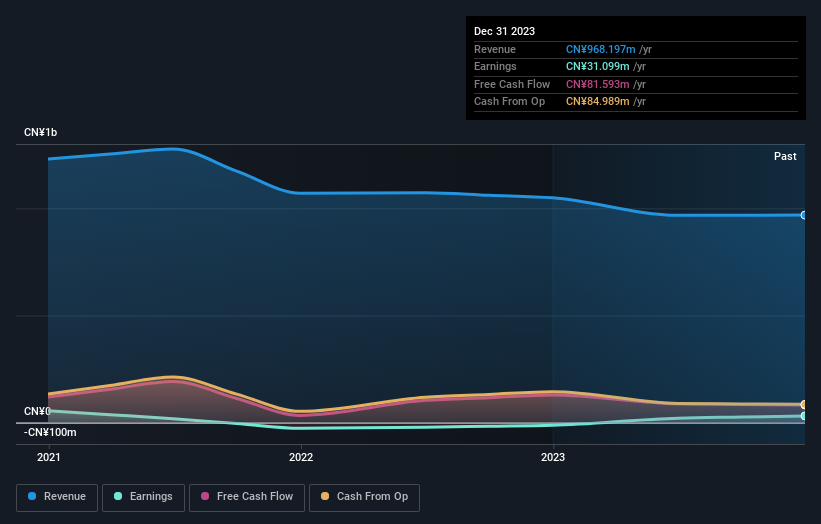Despite recent sales, Zhongmin Baihui Retail Group Ltd. (SGX:5SR) insiders still hold the largest share with a 68% interest
Key Insights
Insiders appear to have a vested interest in Zhongmin Baihui Retail Group's growth, as seen by their sizeable ownership
A total of 3 investors have a majority stake in the company with 55% ownership
A look at the shareholders of Zhongmin Baihui Retail Group Ltd. (SGX:5SR) can tell us which group is most powerful. The group holding the most number of shares in the company, around 68% to be precise, is individual insiders. Put another way, the group faces the maximum upside potential (or downside risk).
Despite selling some shares recently, insiders control a good portion of the company's stock.
Let's take a closer look to see what the different types of shareholders can tell us about Zhongmin Baihui Retail Group.
View our latest analysis for Zhongmin Baihui Retail Group
What Does The Lack Of Institutional Ownership Tell Us About Zhongmin Baihui Retail Group?
Institutional investors often avoid companies that are too small, too illiquid or too risky for their tastes. But it's unusual to see larger companies without any institutional investors.
There could be various reasons why no institutions own shares in a company. Typically, small, newly listed companies don't attract much attention from fund managers, because it would not be possible for large fund managers to build a meaningful position in the company. On the other hand, it's always possible that professional investors are avoiding a company because they don't think it's the best place for their money. Institutional investors may not find the historic growth of the business impressive, or there might be other factors at play. You can see the past revenue performance of Zhongmin Baihui Retail Group, for yourself, below.
Zhongmin Baihui Retail Group is not owned by hedge funds. Our data suggests that Swee Keng Lee, who is also the company's Top Key Executive, holds the most number of shares at 23%. When an insider holds a sizeable amount of a company's stock, investors consider it as a positive sign because it suggests that insiders are willing to have their wealth tied up in the future of the company. Kaitong Chen is the second largest shareholder owning 22% of common stock, and Caiye Su holds about 11% of the company stock. Interestingly, the second-largest shareholder, Kaitong Chen is also Chief Executive Officer, again, pointing towards strong insider ownership amongst the company's top shareholders.
After doing some more digging, we found that the top 3 shareholders collectively control more than half of the company's shares, implying that they have considerable power to influence the company's decisions.
Researching institutional ownership is a good way to gauge and filter a stock's expected performance. The same can be achieved by studying analyst sentiments. As far as we can tell there isn't analyst coverage of the company, so it is probably flying under the radar.
Insider Ownership Of Zhongmin Baihui Retail Group
While the precise definition of an insider can be subjective, almost everyone considers board members to be insiders. The company management answer to the board and the latter should represent the interests of shareholders. Notably, sometimes top-level managers are on the board themselves.
Most consider insider ownership a positive because it can indicate the board is well aligned with other shareholders. However, on some occasions too much power is concentrated within this group.
Our most recent data indicates that insiders own the majority of Zhongmin Baihui Retail Group Ltd.. This means they can collectively make decisions for the company. So they have a S$98m stake in this S$144m business. Most would argue this is a positive, showing strong alignment with shareholders. You can click here to see if those insiders have been buying or selling.
General Public Ownership
With a 19% ownership, the general public, mostly comprising of individual investors, have some degree of sway over Zhongmin Baihui Retail Group. This size of ownership, while considerable, may not be enough to change company policy if the decision is not in sync with other large shareholders.
Private Company Ownership
Our data indicates that Private Companies hold 12%, of the company's shares. It's hard to draw any conclusions from this fact alone, so its worth looking into who owns those private companies. Sometimes insiders or other related parties have an interest in shares in a public company through a separate private company.
Next Steps:
It's always worth thinking about the different groups who own shares in a company. But to understand Zhongmin Baihui Retail Group better, we need to consider many other factors. Consider for instance, the ever-present spectre of investment risk. We've identified 2 warning signs with Zhongmin Baihui Retail Group (at least 1 which is concerning) , and understanding them should be part of your investment process.
Of course this may not be the best stock to buy. So take a peek at this free free list of interesting companies.
NB: Figures in this article are calculated using data from the last twelve months, which refer to the 12-month period ending on the last date of the month the financial statement is dated. This may not be consistent with full year annual report figures.
Have feedback on this article? Concerned about the content? Get in touch with us directly. Alternatively, email editorial-team (at) simplywallst.com.
This article by Simply Wall St is general in nature. We provide commentary based on historical data and analyst forecasts only using an unbiased methodology and our articles are not intended to be financial advice. It does not constitute a recommendation to buy or sell any stock, and does not take account of your objectives, or your financial situation. We aim to bring you long-term focused analysis driven by fundamental data. Note that our analysis may not factor in the latest price-sensitive company announcements or qualitative material. Simply Wall St has no position in any stocks mentioned.

 Yahoo Finanza
Yahoo Finanza 

